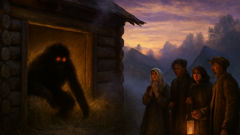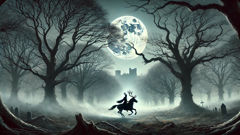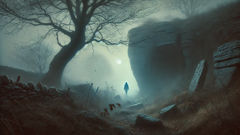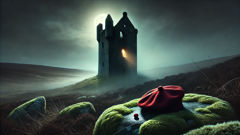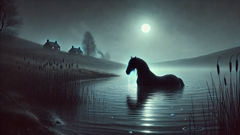Introduction
The wind swept across the endless expanse of the Russian plain, stirring the silver birch trees that guarded the edge of the village of Staraya Polyana. Here, where the land surrendered reluctantly to the encroaching forests, life was dictated by the rhythm of the seasons and the strict observance of traditions passed down like family heirlooms. In this rural world, where dusk stretched long and shadows seemed to flicker with secrets, every household took special care with the grain harvest. For the threshing house—its thick log walls heavy with the scents of straw, smoke, and old hopes—was not just a barn, but the heart of survival. It was also, everyone agreed in hushed voices, a place haunted by the Ovinnik: a spirit older than memory, as capricious as fire, as hungry as winter. Children grew up on whispered warnings, adults checked and double-checked their rituals, and on certain nights, an uneasy silence clung to the village like frost. Yet, for all their caution, fear was not enough to keep disaster at bay. When a fire broke out one night in the late autumn of 1861, leaping hungrily from the threshing house and threatening to devour the entire village, it became clear that something—or someone—had angered the Ovinnik. Among those who watched the flames devour months of labor was Alena, a weaver's daughter with eyes as blue as the twilight sky and a will as stubborn as spring grass. What began as a story of loss and old fears became, through her courage and wit, a tale of how a community might confront the darkness within its own traditions, and perhaps, find a new path between superstition and survival.
A Village Bound by Grain and Fear
Alena woke before dawn, the world outside her window still shrouded in the deep blue that comes just before sunrise. She pulled her shawl around her shoulders and padded across the creaking floorboards to peer through frost-laced glass at the distant silhouette of the threshing house. Every day began with that silent ritual: a glance to see that it still stood unharmed, its wooden walls outlined against the sky, its roof shedding wisps of last night's smoke. It was there that her father, Mikhail, worked alongside the men of Staraya Polyana, separating wheat from chaff, singing old songs to keep the rhythm and to appease whatever spirits might be listening.
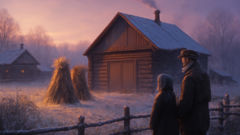
The Ovinnik was not a legend to be dismissed in her family. Alena's grandmother had told her stories by the fire on long winter nights—stories of barns that burst into flame for no reason, of families ruined in a single night, of strange footprints in the ash. The Ovinnik, she said, was a spirit of contradictions: greedy, jealous, quick to anger but not impossible to placate. You could not see him unless he wanted to be seen, but sometimes you felt his touch—a cold hand on your shoulder, a prickling on your neck as you crossed the dark threshold with a bucket of grain. The proper offerings were vital: a black rooster, a cake of honey bread, a whisper of gratitude and apology left in the shadows. Only a fool risked his wrath.
That year, the harvest was better than any in memory, the fields heavy with golden stalks. Yet unease threaded the villagers' conversations. Old Kirill, who kept watch by the barn at night, complained that something moved among the sheaves. The Miller's wife swore she heard a voice hissing from the rafters. Even the priest, Father Alexei, offered extra prayers for protection, though he scoffed at superstition in public. Alena, curious and not easily frightened, began to notice small things: scorched patches on the barn floor, a smell of burning in the air when the wind was still, odd piles of feathers where no chickens had roosted.
The village elders held a meeting to discuss preparations for the approaching Kolyada festival. Winter would soon tighten its grip, and before the snow sealed the roads, everyone needed to store enough grain and flour to last till spring. Yet, even as they planned, they argued quietly about the Ovinnik. Some called for more elaborate offerings; others wanted to hire a wise woman from the next village to perform a cleansing. Mikhail, Alena’s father, listened to all sides and then shrugged. “We do what our fathers did, and their fathers before them. That’s all anyone can do.”
When the festival arrived, the air was thick with the scent of pine, honey, and bread. The villagers gathered around bonfires, singing, feasting, and lighting candles for the ancestors. Alena watched as her mother slipped into the barn with a plate of roasted meat and a mug of kvass, whispering old words as she placed them in the darkest corner. That night, as the moon rose pale above the frost-tipped roofs, Alena dreamed of glowing eyes peering from the threshing house, and a voice like dry straw whispering her name.
Fire and Shadow: The Wrath of the Ovinnik
The fire came with terrifying suddenness. It began as a distant crackle—at first mistaken for a fox rummaging in straw or for the wind rattling loose thatch. But then came the smell: sharp, acrid, unmistakable. Someone shouted, and in moments the night exploded with orange light. The threshing house blazed against the darkness, flames licking greedily up its walls, embers swirling into the sky like a flock of furious birds.
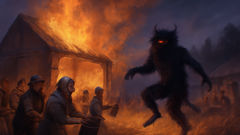
Villagers rushed to form a bucket line, passing water from the well in a desperate attempt to douse the fire. Alena ran beside her father, heart hammering, her breath visible in the cold air. She saw her neighbors' faces twisted in fear, heard children crying and the old men cursing. For all their efforts, the flames only seemed to grow, as if fed by an invisible hand. Through gaps in the smoke, Alena glimpsed something unnatural—a squat, shadowy figure dancing atop a mound of burning chaff, eyes glowing red as coals.
By dawn, nothing remained of the threshing house but a blackened skeleton. The precious grain—so many months' labor—had been reduced to smoldering ash. The elders called an emergency meeting. Some blamed carelessness, others whispered of the Ovinnik's anger. The debate turned bitter. "Someone forgot the offering," one woman insisted. "No one swept the floor with the right broom," muttered another. When Father Alexei suggested a prayer service, half the village scoffed. The other half made secret signs against evil.
Alena was haunted by what she had seen. She remembered her grandmother's tales: if you see the Ovinnik, trouble is sure to follow. She confided in her friend Petr, a shy boy who worked as an apprentice blacksmith. "Maybe he's angry we forgot something," Alena said. "Or maybe he just wants us to be afraid."
The weeks that followed were hard. With their grain stores destroyed, families bartered what little they had left. Some went hungry; others talked of moving to distant towns. Yet Alena felt a strange compulsion—part fear, part curiosity—to face the threshing house ruins alone. One evening she slipped away, carrying a candle, a piece of honey bread, and her grandmother's old shawl. The air was sharp with frost, the sky bruised with the colors of impending night.
In the ruins, shadows clung to every corner. Alena set her offerings down on a charred beam and whispered, "We’re sorry if we forgot you. Please, let us live through winter." For a moment, nothing stirred. Then, in the deepest shadow, a pair of eyes ignited. The Ovinnik appeared—not as a monster, but as a hunched old man wrapped in black fur, his eyes bright with ancient grief. His voice was dry as wind in a wheat field. "You remember," he rasped. "But many do not."
He reached out a clawed hand toward Alena. She froze, but instead of striking her, he brushed her cheek with a finger as cold as snow. "Tell them," he said. "Tell them the old ways matter. Or I will burn more than grain next time." Then he vanished, leaving only the scent of smoke and a single black feather where he had stood.
Between Tradition and Tomorrow
Alena’s encounter changed something in her. She became restless, unwilling to accept defeat or simply mourn what was lost. The next morning, she told her father everything. Mikhail listened in silence, then nodded gravely. He called together the elders, and though some rolled their eyes, most could not ignore the unease that had settled over Staraya Polyana.
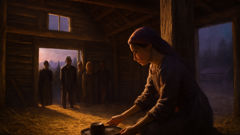
A village meeting was held in the churchyard, where even the most skeptical were forced to admit that something had gone terribly wrong. Some demanded they rebuild the threshing house exactly as before—same logs, same roof, same rituals. Others argued that it was time to move on from superstition and trust only in hard work and common sense. Alena spoke up, her voice steady. "What if we keep the old ways but also use new ones? We can honor the spirit but also be careful with fire and keep watch at night."
Slowly, a compromise took shape. The villagers pooled their remaining resources to rebuild the barn with thicker logs and a new stone hearth to control accidental fires. They invited a wise woman from the next village to bless the new building and teach them songs and rituals they had forgotten. Alena led a group of children in sweeping the floors and leaving offerings of bread and milk in the corners. Petr made new iron hinges for the doors, inscribed with protective runes.
When the new threshing house was finished, the entire village gathered for a feast. At sunset, Alena placed a plate of black bread and salt in the shadow of the barn. She whispered a prayer—not just for protection, but for wisdom: to know when to follow tradition and when to question it. As night fell and the stars came out, a gentle warmth filled the barn—not fire, but something older and kinder. In the rafters, an owl hooted softly, and somewhere in the darkness, Alena thought she saw a pair of eyes watching, no longer full of rage but flickering with something almost like approval.
Winter came early that year, blanketing Staraya Polyana in snow. But there were no more fires, and though times were hard, no one went hungry. Alena grew into her role as both keeper of stories and questioner of customs. She reminded her neighbors that every ritual had a purpose—but that purpose could be remembered and renewed, not just repeated without thought. And in the quiet nights, when wind rattled the eaves and frost crept across the windows, she sometimes felt a cold presence at her shoulder, no longer threatening but protective—an ancient spirit appeased, but never entirely gone.
Conclusion
Generations later, Staraya Polyana still stands—smaller now, its streets quieter, but the threshing house remains at its heart. The story of Alena and the Ovinnik is told to every child born in the village, not as a threat but as a lesson. It’s a tale about respect: for traditions, for each other, and for the mysterious forces that shape life in places where the forest presses close and winter lingers long. Some claim the Ovinnik still visits on moonless nights, his presence marked by a stray feather or a whiff of smoke. Yet no more barns have burned, and every harvest brings new celebrations. Alena’s legacy is not just in the rituals she revived but in the questions she asked—reminding her people that wisdom lies not only in obeying the old ways, but in understanding them and adapting them for a world that keeps changing. The threshing house endures, its timbers seasoned by time and stories alike, a silent witness to the uneasy truce between fire and grain, fear and hope, memory and tomorrow.

